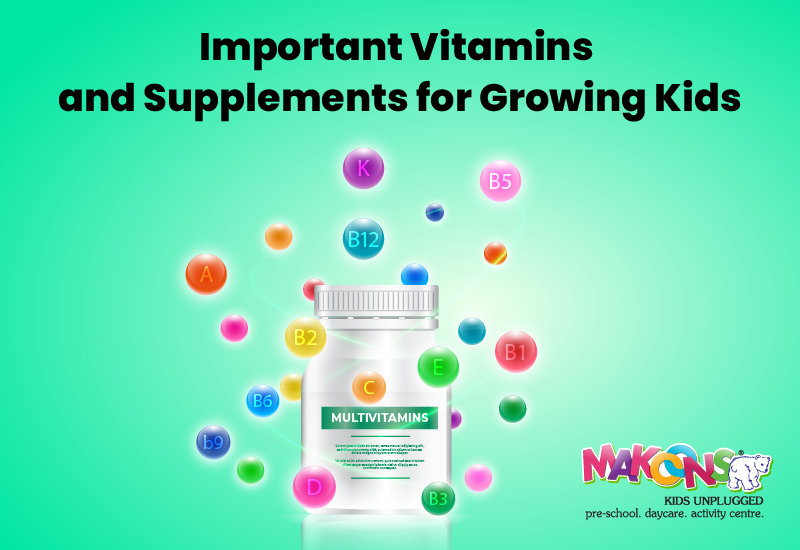Introduction
As parents, one of our top priorities is to raise our children to be robust, healthy, and active adults. Kids with busy schedules, a high intake of processed foods, or picky eaters may find it difficult to obtain the nutrients they need from a balanced diet.You need children’s vitamins and health supplements here. But with so many options available, how do you choose the best supplements for kids?
The most crucial vitamins for developing children, how to determine whether they aren’t getting enough of them, typical mistakes parents make, and helpful tips for selecting the best supplements are all covered in this blog post.
The Significance of Supplements for Children
The Importance of Supplements for Kids–
Most children don’t always eat the best diet, let’s face it. Additionally, they may find it difficult to eat healthily despite their best efforts due to factors like allergies, finicky eaters, or school-related stress. To stay active, develop strong bones, think clearly, and avoid disease, children’s bodies require a consistent supply of vitamins and minerals.
Supplements can help in these situations:
• When kids are really picky about what they eat
•If they can’t eat certain foods or have allergies
•When they grow quickly
•When they get sick a lot
•If they are always tired or don’t have enough energy
Although they shouldn’t be taken in place of meals, supplements can help you get the nutrients you need when food isn’t enough.
Vital Vitamins for Developing Children
Here are some of the most important vitamins and minerals that kids need to grow:
1.Vitamin A
•Good for your skin, vision, and immune system.
•Found in: vegetable names like Carrots, spinach, and sweet potatoes .
•Tip: Choose the beta-carotene form; it’s safer for kids.
2. Vitamin B complex
•These are good for your energy, brain development, and nervous system.
• Good sources include meat, milk, eggs, and whole grains.
• Advice: B-complex supplements are a good option because they contain all the necessary components.
3. Vitamin C:
Enhances iron absorption, boosts immunity, and promotes wound healing.Strawberries, oranges, and tomatoes are some of the foods that contain it.
•Tip: Children usually like chewables or gummies that contain vitamin C.
4. Vitamin D:
Essential for calcium absorption and bone strength, it can be found in eggs, fortified milk, and sunlight.
•Suggestion: Vitamin D3 supplements are required if your child does not get enough sunlight.
5. Vitamin E
Plant-based oils, Famous Dry fruits names like nuts, and seeds contain vitamin E, an antioxidant that promotes healthy skin, eyes, and the immune system.
6. Iron
This vitamin is important for keeping blood oxygen levels stable and helping the brain grow. You can get it from lentils, red meat, and spinach.
•You should look for iron drops or chewables that are safe for kids because low iron can make you tired or make your skin look pale.
7. Calcium
Tofu, leafy greens, and dairy products are all good sources of calcium. It is important for strong bones and teeth.
•For optimal absorption, calcium and vitamin D should always be combined.
8. Zinc
•promotes immunological health, growth, and healing.
•Found in: Nuts, meats, and whole grains.
Signs That Your Child Might Be Missing Nutrients
The following signs could point to a vitamin deficiency, though they might not always be obvious right away:
•Persistent fatigue or low vitality
•Constantly getting sick
•Brittle nails, hair loss, or dry skin
•Weak bones or delayed growth
•Inability to focus
•Frequent bruises or pale skin
It might be time to consult a physician or dietitian if you observe a few of these.
How to Choose the Right Supplements?
I’ve learned that selecting the correct ones involves more than just picking the most attractive bottle.
1.Make sure that it is age-appropriate
Supplements designed for adults may be far too potent for children.
2. Select reliable brands
Look for certifications that show the supplement has been tested, like NSF or USP.
3. Examine the label.
Look for actual nutrients rather than artificial flavors and sugar. Many gummy supplements are essentially candy disguised as supplements.
4. Select the Proper Format.
Gummies, chewables, or liquids—anything your child enjoys and can handle without any issues.
5. Avoid taking two doses at once.
Steer clear of mixing supplements that have the same vitamins in them. Excess of a good thing can be harmful.
6. Consult a pediatrician
This is really crucial, if the child has a medical condition or is on other medications.
Common Mistakes Parents Make–
During my research, I came across the following errors:
•More thought equals better: Headaches, nausea, or worse can result from taking too much.
•Making a decision solely on taste: It’s not necessarily nourishing just because it tastes good.
•Considering “natural” to be safe: Proper dosage and safety checks are necessary for even natural products.
•Meal skipping because “they take vitamins”: Food cannot be replaced by supplements.
Natural vs Synthetic Supplements – what’s the deal?
Natural supplements are made from real foods, such as fruits and vegetables.
Synthetic supplements are made in labs and contain the same nutrients.
Both can be beneficial. Selecting a high-quality, safe product that works for your child is what matters most. Before administering any supplements, always read the labels and consult a physician.
Are Supplements Necessary for Every Child ?
Not always, to be honest! If a child eats a balanced diet that includes fruits, vegetables, whole grains, proteins, and dairy, they may not need any extra supplements. A lot of parents, though, give their kids a multivitamin every day as a “safety net.”
Concluding Remarks
Ultimately, supplements are just that—a supplement to a healthy way of living. Although they aren’t miracle drugs, they can significantly boost a child’s development and vitality if taken as directed. I hope this post made things easier for everyone, whether you’re a parent watching out for your child or a student like me simply trying to learn more about child health.
Balance is the key, which includes eating real food, drinking lots of water, exercising, getting enough sleep, and using supplements wisely when necessary.
Read About- 10 Best Healthy Foods to Include in Your Kids Meal
Quick FAQs
Q: Are gummies acceptable ?
Yes, provided they don’t contain a lot of sugar. Seek out sugar free or low sugar options.
Q: Can I give my child more than one supplement?
only after ensuring that there is no overlap in their nutritional profiles. Always read the labels!
Q: What time of day is ideal for vitamin administration??
with a meal—preferably one with some fat—to facilitate absorption.
Q: How can i tell you if it’s functioning?
Generally speaking, mood, immunity and energy levels are reliable markers.


